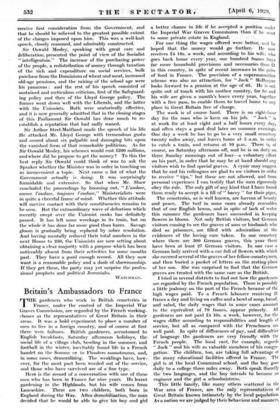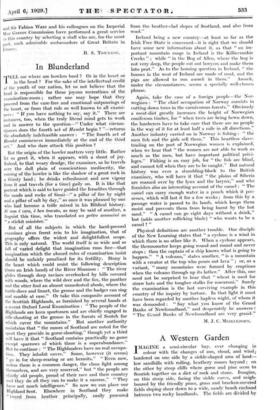Britain's Ambassadors to France
THE gardeners who work in British cemeteries in France, under the control of the Imperial War Graves Commission, are regarded by the French working_ classes as the representatives of Great Britain in their areas. It was a bold experiment to place a number of men to live in a foreign country, and of course at first there were failures. British gardeners, accustomed to English breakfasts, Saturday afternoon holidays, the social life of a village club, bowling in the summer, and football in the winter, inevitably found life in a French hamlet on the Somme or in Flanders monotonous, and, in some cases, demoralizing. The weaklings have, how- ever, for the most part been weeded out of the service, and those who have survived are of a fine type.
Here is the record of a conversation with one of these men who has been in France for nine years. He learnt gardening in the Highlands, but his wife comes from Lancashire. There are two children, both born in England during the War. After demobilization, the man decided that he would be able to give his boy and girl a better chance in life if he accepted a position under the Imperial War Graves Commission than if he we to some private estate in England.
For one thing the wages offered were better,. and he hoped that the money would go further. He now receives £4 10s. a week, and according to his wife, who goes back home every year, one hundred francs buys far more household provisionS and necessaries than 21 in this country, in spite of recent increases in the price of food in France. The provision of a superannuation scheme was also an attraction, for " Jock " MeBrayne looks forward to a pension at the age of 65. He is not quite out of touch with his mother country, for he and his wife are given a month's leave every year, together with a free pass, to enable them to travel home to any place in Great Britain free of charge.
The work is of course hard. There is no eight-hour day for the man who is keen on his job. " Jock " is at work for at least eight and a half hours every dayi and often stays a good deal later on summer evenings: One day a week he has to go to a very small cemetery twenty miles away, and leaves home at 5 a.m. in order to catch a train, and returns at 10 p.m. There is, of course, no Saturday afternoon off, and he is on duty on three Sunday mornings out of four—a voluntary effort on his part, in order that he may be at hand should any visitors wish to find special graves. A cynic may suggest that he and his colleagues are glad to see visitors in order to receive " tips," but these are not allowed, and from personal experience I can testify that the men rigorously obey the rule. The only gift of any kind that I have found them ready to accept is a fill of " bacey " for their pipes; The cemeteries, as is well known, are havens of beauty and peace. The turf in some cases already resembles that of our English lawns, and in spite of lack of water this summer the gardeners have succeeded in keeping flowers in bloom. Not only British visitors, but German visitors coming to see the graves of sons or husbands who died as prisoners, are filled with admiration at the evidences of the loving care taken. In one Cemetery where there are 300 German graves, this year there have been at least 27 German visitors. In one case a German lady arrived with a car full of flowers with which she covered several of the graves of her fellow-countrymen, and then buried a packet of letters on the resting-place of her son. She was surprised to find that the German graves are treated with the same care as the British.
I tried in several districts to fmd out how the gardeners are regarded by the French population. There is possibly a little jealousy on the part of the French because of the high wages paid. To a French labourer receiving 21 francs a day and living on coffee and a bowl of soup, bread, and salad, the daily wages that in some cases amount to the equivalent of 79 francs, appear princely. All gardeners are not paid £4 10s. a week, however, for the wages differ according to responsibilities and length of service, but all as compared with the Frenchmen are well paid. In spite of differences of pay, and difficulties of language the gardeners are very friendly with the French people. The local curt, for example, regards " Jock " and his wife as valuable members of his congre- gation. The children, too, are taking full advantage of the many educational facilities offered in France. The girl is at the local Communal school, and the boy goes daily to a college three miles away. Both speak fluently the two languages, and the boy intends to become an engineer and the girl a schoolmistress.
This little family, like many others scattered in the War area of France, are the only representatives of Great Britain known intimately by the local population. As a nation we are judged by their behaviour and manners, and Sir Fabian Ware and his colleagues on the Imperial War Graves Commission have performed a great service to this country by selecting a staff-who are, for-the most part, such. admirable ambassadors of Great Britain' in -B. S. TOWIck)F.. • •







































 Previous page
Previous page